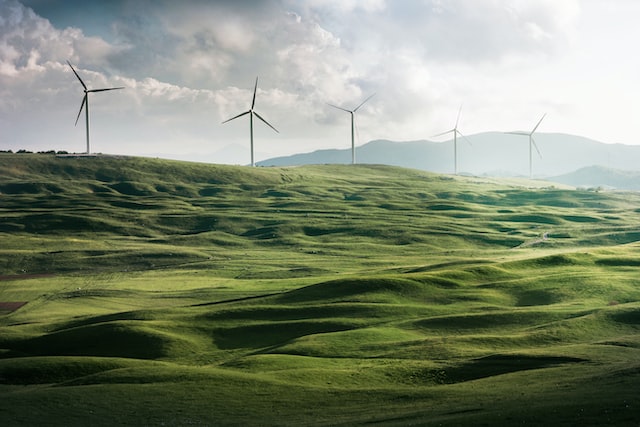Even renewable energy, the latest fad, is known to cause tremendous pollution whether wind, solar or hydro. Renewable energy often requires more land than fossil fuel production, with infrastructure fragmenting or even eliminating high-quality wildlife habitat, according to Christopher E Moorman, Professor of fisheries, wildlife, and conservation biology at South Carolina University
 Shivaji Sarkar
Shivaji Sarkar

Greenhouse global warming and climate change are parallelly being used by pollution lobbies that have turned it into big business, raking in bigger profits in the West.
Climate change is a regular geophysical phenomenon, and nobody has ever been able to stop it. India has taken the most sensitive stand of ‘phasing down’ coal that needs to be extended to the entire climate concern at COP27 at Sharm-el-Sheikh in Egypt. The Climate Accountability Institute of UK’s Carbon Majors study finds that only 100 companies contribute 72 percent or one trillion tonnes of emissions globally since 1988.
At the COP26, India was among the nations which insisted that in the Glasgow Climate Pact, coal be “phased down” and not “phased out”, citing the principle of common but differentiated responsibilities when tackling climate change. In the same vein, India should also tackle vehicle emissions and not succumb to western pressures.
Similarly, today stubble or parali burning is a localised north-western Indian phenomenon that is being magnified to the extent of forcing the banning of cars that contribute only 8 percent of total emissions, because that suits automakers to sell more and possibly churn out benefits to some. It overlooks that junking usable cars causes more pollution.
India was right but it could have gone further to state that man is too weak to change the global climate. Yes, the warming of the environment has been largely a western propagation. The natural factors are constant. Even glaciers directly affect the landscape in many ways shaping and reshaping the earth’s surface. Environment Minister Bhupendra Yadav says he would stress $100 billion yearly assistance annually to developing countries to meet climate targets as insisted by the West.
Geological records show that there have been several variations in the earth’s climate. There are many natural factors, including changes in the sun, emissions from volcanoes, variations in the earth’s orbit, and levels of carbon dioxide. It is changed by volcanic eruptions, variability in the orbit of the earth, and shifts in the earth’s crust or plate tectonics.
Every volcanic eruption is full of pollutants. Not just ash and dust but also carbon dioxide: one of the strongest greenhouse gases on our planet. In the largest cases, a single volcanic plume, lasting only hours, might add many millions of tonnes of carbon dioxide to the atmosphere. Individual volcanoes add more carbon dioxide to our atmosphere than human activity of globes’ people do.
The unprecedented drought in Europe and parts of America that dried up major rivers is a natural phenomenon and no man even without lighting up a single fire could have stopped it. Had it been so there would not have been Manu or Noah’s ark in the face of the great flooding.
So, COP27 could have reopened the rationality of the Paris Agreement to limit global warming to below 2 degrees Celsius. The European 2022 summer heat surpasses it by quite a few notches above that. But the West wants fledgling countries like India to adhere to the irrational goals.
A new report The Big Con compiled by Global Forest Coalition and Friends of the Earth International and Corporate accountability outline a disturbing collusion between polluters and policymakers. The emerging reality is that greenhouse gases are nothing compared to the natural causes of heating up the earth. The worst sufferers are the 46 least developing countries (LDC), says United Nations Conference for Trade and Development. It questions the global drive to reduce carbon emissions as LDCs could face severe fiscal constraints and loss of economic output.
The Indian delegation led by Minister Bhupendra Yadav is expected to rake up the issue of loss and damage finance facility — a fund for climate reparations paid to countries weak in facing the climate change impact. India wants to work out the climate fund and its modalities. There are apprehensions that developed being least interested in a solution has not allowed inclusion on the agenda.
The West has a different approach. It says global warming is the long-term heating of the Earth’s surface observed since the pre-industrial period (between 1850 and 1900) due to human activities, primarily fossil fuel burning, which increases heat-trapping greenhouse gas levels in the earth’s atmosphere. It does not want this term replaced with “climate change”. Despite the recent summer heat in Europe, they would not agree with the factor of the geophysical changes that are becoming so frequent.
There are known phenomena in seven different glacial and inter-glacial ages. Even renewable energy, the latest fad, is known to cause tremendous pollution whether wind, solar or hydro. Renewable energy often requires more land than fossil fuel production, with infrastructure fragmenting or even eliminating high-quality wildlife habitat, according to Christopher E Moorman, Professor of fisheries, wildlife, and conservation biology at South Carolina University. It can also lead to a variety of other impacts on wildlife, including behaviourial changes and direct mortality.
Solar is supposed to generate 34600 tonnes of junk every year by 2030 in India alone, according to the National Solar Energy Federation of India. The global volume of wind blade waste will be a million tonnes by 2035 from 30,000 tons in 2021, according to Bloomberg. It is partly recyclable at a high cost. But wind panels made of composites are neither biodegradable nor can be recycled. As per a US study by 2050, it would be a cumulative 2.2 million tons and occupy one percent of the landfill area. Hydro has several hazards including the water being turned turbid, sinking a large area, and weight that slows down the earth’s rotation as China’s Three Gorges Dam.
Lithium-ion batteries contain metals such as cobalt, nickel, and manganese, which are toxic and can contaminate water supplies and ecosystems if they leach out of landfills apart from fires. The lithium itself is hazardous, causes tremendous water evaporation, and adds to warming. These would impact the earth in many ways, but COP27 will not discuss it.
Climate change and warming are much wider issues beyond the scope of the COP, which should have gone into the core to save the earth instead of superficially treating it. Or it can also mull if there is a repeat of Noah’s great flood, which would be due to man-made gases or climatic factors. Let it not be a business proposition at the graveyard. —INFA

The writer is a former senior editor, of The Financial Express and Professor, Indian Institute of Mass Communication





